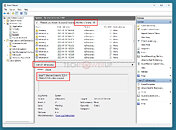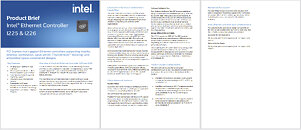- Joined
- Oct 9, 2007
- Messages
- 47,609 (7.45/day)
- Location
- Dublin, Ireland
| System Name | RBMK-1000 |
|---|---|
| Processor | AMD Ryzen 7 5700G |
| Motherboard | Gigabyte B550 AORUS Elite V2 |
| Cooling | DeepCool Gammax L240 V2 |
| Memory | 2x 16GB DDR4-3200 |
| Video Card(s) | Galax RTX 4070 Ti EX |
| Storage | Samsung 990 1TB |
| Display(s) | BenQ 1440p 60 Hz 27-inch |
| Case | Corsair Carbide 100R |
| Audio Device(s) | ASUS SupremeFX S1220A |
| Power Supply | Cooler Master MWE Gold 650W |
| Mouse | ASUS ROG Strix Impact |
| Keyboard | Gamdias Hermes E2 |
| Software | Windows 11 Pro |
The Intel Ethernet i226-V onboard 2.5 GbE controller appears to have a design flaw that causes the Ethernet connection to drop at random times for a few seconds. The I226-V is the latest version of Intel's cost-effective 2.5 Gbps Ethernet networking chips meant for PC motherboards with chipsets that have integrated MACs (i.e. Intel chipsets). It succeeds the I225-V, which was Intel's first consumer 2.5 GbE PHY. The I225-V was plagued by various issues that caused it to be unstable at 2.5 Gbps (but could be worked around by forcing 1 GbE mode). Many premium Intel 700-series chipset Socket LGA1700 motherboards integrate the new I226-V, which is the I225's successor, as their default onboard 2.5 GbE controller. Some enthusiast-segment motherboards have a second Ethernet controller that's either of a different brand (such as Realtek or Marvell), or a different kind of wired Ethernet (such as 10 GbE).
Since mid-December, users of Intel 700-series chipset motherboards (which debut the I226-V), have been reporting random connections drops to Intel's Support Community, Microsoft, ASUS and Reddit 1, 2, 3, 4, 5. These drops are momentary, last a few seconds, and you'll mostly not notice it; however for applications that need an uninterrupted connection (such as online gaming, video conferencing, VPN, Remote Desktop etc.), such a link drop will be noticeable. You can check if you are affected by opening Windows Event Viewer, navigate to "Windows Logs," "System" and search for "e2fnexpress," in particular Event 27 "Intel Ethernet Controller I226-V, Network link is disconnected." and Event 32 "Intel Ethernet Controller I226-V. Network link has been established at 1 Gbps full duplex." We've experienced the issue in our labs. We tried updating to the latest 27.8 drivers from Intel, and used the latest motherboard BIOS, at 1 Gbps speed, but the issue couldn't be fixed reliably. In the end, we just switched over to the motherboard's second network interface, which is not an Intel NIC, and the issue went away. Another option could be to buy a cheap PCI-Express network card or use the board's integrated Wi-Fi. Still, such issues aren't acceptable, especially not from a world-leading manufacturer like Intel, who once was reputed for the quality of its networking equipment. Intel and its motherboard partners need to get on top of this issue.



Update Mar 1st: Intel has issued a Windows workaround and patch for these issues. Let us know if this fixes it for you.
Update Mar 4th: User @lovingbenji reports that on his system this new driver version does not fix the disconnect issue.
View at TechPowerUp Main Site
Since mid-December, users of Intel 700-series chipset motherboards (which debut the I226-V), have been reporting random connections drops to Intel's Support Community, Microsoft, ASUS and Reddit 1, 2, 3, 4, 5. These drops are momentary, last a few seconds, and you'll mostly not notice it; however for applications that need an uninterrupted connection (such as online gaming, video conferencing, VPN, Remote Desktop etc.), such a link drop will be noticeable. You can check if you are affected by opening Windows Event Viewer, navigate to "Windows Logs," "System" and search for "e2fnexpress," in particular Event 27 "Intel Ethernet Controller I226-V, Network link is disconnected." and Event 32 "Intel Ethernet Controller I226-V. Network link has been established at 1 Gbps full duplex." We've experienced the issue in our labs. We tried updating to the latest 27.8 drivers from Intel, and used the latest motherboard BIOS, at 1 Gbps speed, but the issue couldn't be fixed reliably. In the end, we just switched over to the motherboard's second network interface, which is not an Intel NIC, and the issue went away. Another option could be to buy a cheap PCI-Express network card or use the board's integrated Wi-Fi. Still, such issues aren't acceptable, especially not from a world-leading manufacturer like Intel, who once was reputed for the quality of its networking equipment. Intel and its motherboard partners need to get on top of this issue.



Update Mar 1st: Intel has issued a Windows workaround and patch for these issues. Let us know if this fixes it for you.
Update Mar 4th: User @lovingbenji reports that on his system this new driver version does not fix the disconnect issue.
View at TechPowerUp Main Site




 .
.




